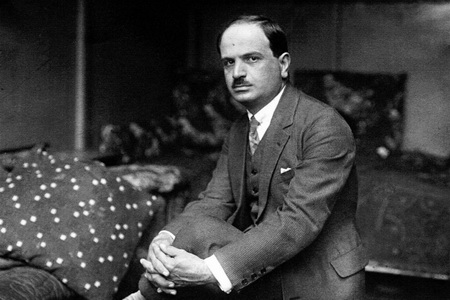Parliamentary Library acquires painter David Kakabadze’s “unique“ artwork

A piece of artwork linking two outstanding figures of 20th century Georgian art will be preserved in the country after it was acquired by the National Parliamentary Library of Georgia.
Painter David Kakabadze’s 1929 work for poet Terenti Graneli was first revealed to the general public last year, when it was delivered for temporary display to Tbilisi’s State Museum of Literature of Georgia.
Coming from a private collection, the abstract piece features handwritten notes from the artist and the recipient.

Kakabadze’s 1929 work for poet Terenti Graneli. Photo: State Museum of Literature of Georgia.
The museum announced it was looking for sponsors to help it purchase the work, valued at 15,000 USD, so that it could be preserved in Georgia.
The appeal stressed the importance of making the "unique example of connecting painting and literature" available for the public in the country.
The year-long search for donors ended this week, when National Parliamentary Library of Georgia General Director Giorgi Kekelidze announced the venue had purchased the work.
Kekelidze said the library had acquired the piece following "multiple forensic studies” and reports by professional commissions on its origins and authenticity.
The library director also said the 1929 work by Kakabadze was set to be preserved at the museum of books at the venue, set to be launched in the near future.
As well as its artistic value, the piece is recognised as an important historical piece of Georgian art of the 20th Century due to its relation to the two famous figures.

Terenti Graneli enjoyed prolific work in poetry in the 1920s.
Kakabadze worked as painter, theatre and cinema designer and art researcher in Georgia during the first half of the 20th Century.
He is today considered one of the more prominent figures of contemporary Georgian art and one of the founders of Georgia's theatrical design school.
Terenti Graneli was born in western Georgia but moved to Tbilisi in 1918. He worked in newspaper offices in the capital before he embarked on a literary career and produced poems throughout the 1920s.
Graneli was known for his vocal opposition to the Soviet censorship of art, which meant local newspapers refused to print his works starting in 1926.
The literary legacy of the late poet was recognised in Georgia in the late years of the Soviet rule, which culminated in Graneli's reburial from a regular cemetery to the distinctive Didube Pantheon of Public Figures in Tbilisi in 1987.
 Tweet
Tweet  Share
Share